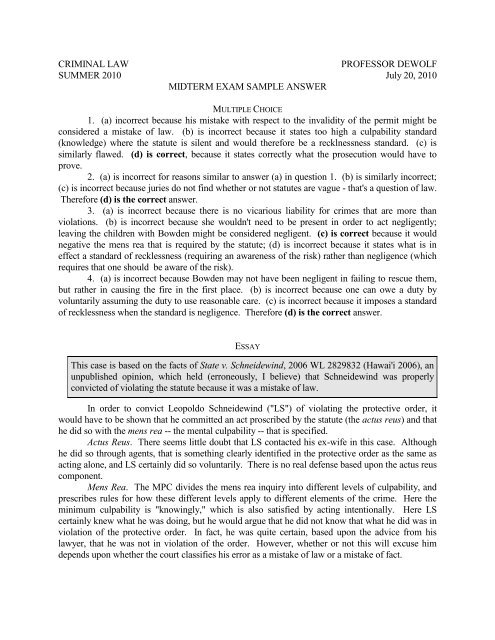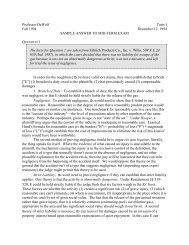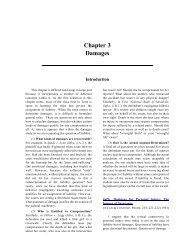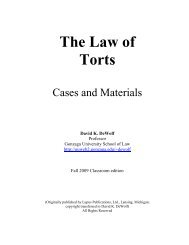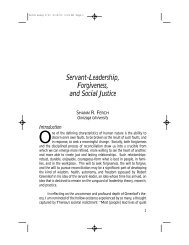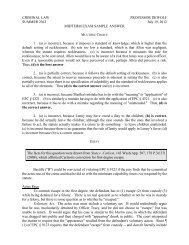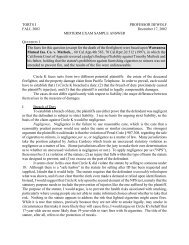Sample Answer
Sample Answer
Sample Answer
Create successful ePaper yourself
Turn your PDF publications into a flip-book with our unique Google optimized e-Paper software.
CRIMINAL LAWPROFESSOR DEWOLFSUMMER 2010 July 20, 2010MIDTERM EXAM SAMPLE ANSWERMULTIPLE CHOICE1. (a) incorrect because his mistake with respect to the invalidity of the permit might beconsidered a mistake of law. (b) is incorrect because it states too high a culpability standard(knowledge) where the statute is silent and would therefore be a recklnessness standard. (c) issimilarly flawed. (d) is correct, because it states correctly what the prosecution would have toprove.2. (a) is incorrect for reasons similar to answer (a) in question 1. (b) is similarly incorrect;(c) is incorrect because juries do not find whether or not statutes are vague - that's a question of law.Therefore (d) is the correct answer.3. (a) is incorrect because there is no vicarious liability for crimes that are more thanviolations. (b) is incorrect because she wouldn't need to be present in order to act negligently;leaving the children with Bowden might be considered negligent. (c) is correct because it wouldnegative the mens rea that is required by the statute; (d) is incorrect because it states what is ineffect a standard of recklessness (requiring an awareness of the risk) rather than negligence (whichrequires that one should be aware of the risk).4. (a) is incorrect because Bowden may not have been negligent in failing to rescue them,but rather in causing the fire in the first place. (b) is incorrect because one can owe a duty byvoluntarily assuming the duty to use reasonable care. (c) is incorrect because it imposes a standardof recklessness when the standard is negligence. Therefore (d) is the correct answer.ESSAYThis case is based on the facts of State v. Schneidewind, 2006 WL 2829832 (Hawai'i 2006), anunpublished opinion, which held (erroneously, I believe) that Schneidewind was properlyconvicted of violating the statute because it was a mistake of law.In order to convict Leopoldo Schneidewind ("LS") of violating the protective order, itwould have to be shown that he committed an act proscribed by the statute (the actus reus) and thathe did so with the mens rea -- the mental culpability -- that is specified.Actus Reus. There seems little doubt that LS contacted his ex-wife in this case. Althoughhe did so through agents, that is something clearly identified in the protective order as the same asacting alone, and LS certainly did so voluntarily. There is no real defense based upon the actus reuscomponent.Mens Rea. The MPC divides the mens rea inquiry into different levels of culpability, andprescribes rules for how these different levels apply to different elements of the crime. Here theminimum culpability is "knowingly," which is also satisfied by acting intentionally. Here LScertainly knew what he was doing, but he would argue that he did not know that what he did was inviolation of the protective order. In fact, he was quite certain, based upon the advice from hislawyer, that he was not in violation of the order. However, whether or not this will excuse himdepends upon whether the court classifies his error as a mistake of law or a mistake of fact.
DeWolf, Criminal Law, Summer 2010, Midterm, <strong>Sample</strong> <strong>Answer</strong> Page 2Mistake of Law. MPC § 2.02(9) states the familiar rule that "ignorance of the law is noexcuse." More specifically, it states that, unlike the culpability required for other elements of theoffense, there is no need for the prosecution to show that the defendant had any knowledge orreason to know of the "existence, meaning or application of the law determining the elements of anoffense . . . ." (italics added) If LS's mistake regarding the meaning of "contact" was a mistakeregarding the application of the law, then he can't offer his good faith belief as a defense. On theother hand, if he made a mistake of fact, or of non-penal law, then he would be entitled to show thathe did not commit the violation knowingly.Mistake of Fact / Non-penal Law. MPC § 2.04 states that a mistake of fact or [non-penal]law is a defense if it negatives the mens rea that is required. Since LS didn't know that "contact"included service of process by an agent, that would negative the "knowingly" requirement of EPC §586-11, but only if this is considered non-penal law, i.e., if it does not constitute the lawdetermining the elements of an offense. We would argue that LS is in a position similar to that ofSmith, the tenant who destroyed fixtures that belonged to his landlord. Because he was mistakenabout the law of property, not the law of malicious destruction, Smith was allowed to offer hismistaken belief as a defense. We would similarly argue that LS made a mistake as to the meaningof the protective order, not as to whether or not a violation of a protective order is a crime. On theother hand, a court might find that in contacting Russell LS was making a mistake regarding theapplication of the law and reject a mistake defense.Official Reliance. Even if the court determined that LS made a mistake of law rather than amistake of fact, there is an escape hatch for official reliance (MPC § 2.04(3)(b)(iv)). Applying thatsection, it appears that LS reasonably relied upon his attorney, and the attorney in turn did duediligence. However, to qualify for this relief the defendant must have relied upon an interpretationof the law by "the public officer or body charged . . . with responsibility for the interpretation . . . ofthe law." The two prosecuting attorneys, much less LS’s attorney, wouldn’t qualify. Thus, it seemsunlikely that he would succeed in an official reliance defense, although it might mitigate hispunishment.
DeWolf, Criminal Law, Summer 2010, Midterm, <strong>Sample</strong> <strong>Answer</strong> Page 3ESSAY CHECKLIST Overview Actus Reus + Mens Rea Actus Reus easily satisfied LS voluntarily instructed agents Mens rea Standard of knowing Mistake of Law Penal or non-penal law? Did he make a mistake regarding the law determining the elements of the offense? If so, no defense Mistake of Fact or Non-penal law Protective Order as Non-penal law MPC: A defense if it Negatives the mens rea Analogy to Regina v. Smith LS didn't know protective order prohibited serving process Official Reliance (§ 2.04(3)(b)(iv) Reasonable reliance on attorney Not likely to be found the "public officer"Exam # __________________


